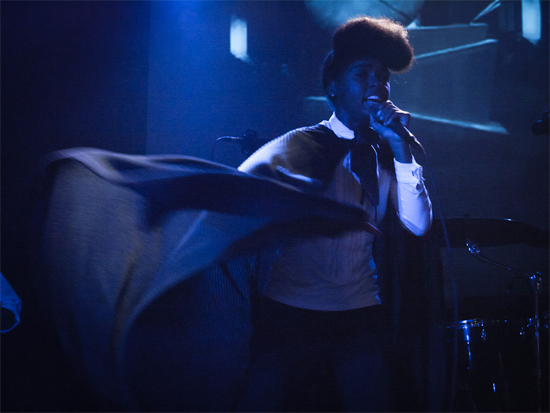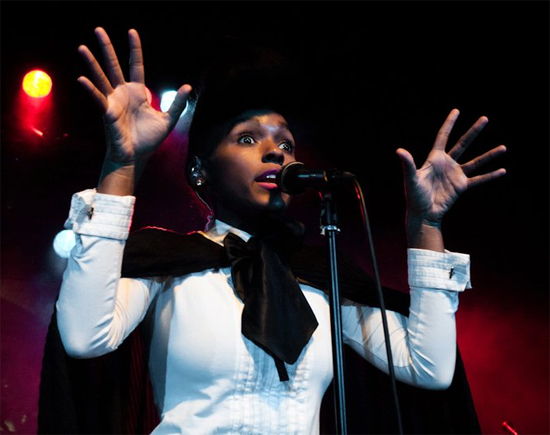When Janelle Monáe burst onto our computer screens in May this year with her breathtaking performance of ‘Tightrope’ on The Late Show with David Letterman, it felt like something remarkable had happened. Four years developing under the watchful eye of Big Boi and his pal Mr Diddy Daddy, who duly appeared at the song’s end that night to bow at her feet, had bred what looked at last like a natural star, a diminutive 25 year old who seemed effortlessly to blend the greats of American soul, R&B, rock, hip hop and more. Critics gushed when The ArchAndroid dropped: James Brown, Prince, Diana Ross, David Bowie, Michael Jackson, George Clinton and Stevie Wonder were amongst the names bandied about with abandon, and for once there were undeniable and genuinely satisfying echoes of all of these.
Her credentials were also impeccable: spotted by Big Boi while performing Roberta Flack’s ‘Killing Me Softly’ at an open mic night, pursued by Puff The Magic Bandwagon Jumper after Big Boi had tipped him off, a tour opening for Of Montreal (presumably to bank some credibility before she warmed up audiences for No Doubt). Furthermore, she told Rolling Stone in June, Barack Obama was a fan, and her ‘back story’, as editors and publicists like to refer to people’s pasts, contained just the right amount of grit: Kansas-born, to a janitor mother and crack-addicted father. The media was spoiled, and the media therefore thanked her with the kind of coverage normally reserved for drug-addled models with absent minds when it comes to underwear.
But there was one thing that journalists generally claimed to embrace whilst at the same time cautiously glossing over it, and that was the complex concept that allegedly underpinned The ArchAndroid and its preceding EP, which together make up something called Metropolis: Suites I, II and III. (Suite IV is yet to come, apparently.) Inspired by Fritz Lang’s Metropolis, the obvious source of Monáe’s cover imagery, the ‘suites’ see Monáe adopt an alter ego, Cindi Mayweather, an android – of course – sent back in time to save the world and rescue freedom and love from an evil dictatorship. Or an android that falls in love with a human and therefore faces being turned into spare parts. Or something. To be honest, it doesn’t really matter: when The ArchAndroid hits its stride it wouldn’t really matter if it was about Alan Tichmarsh’s double life as a gardener and soft porn novelist. The concept is wholly overshadowed by the sheer weight of the music and performances and, at her finest, Monáe is worth all the hyperbole with which The ArchAndroid has been received.

The trouble is, however, that Monáe – or those around her – seem to think this concept is of real value. Perhaps buried within these lyrics there really is a constructive message, but if so it’s lost within white-hot funk, a battery of brass and soulful wails and a tidal wave of energy. The concept is window-dressing, pure and simple, a superfluous signifier of weight and profundity, and on stage it becomes a diversion from what Monáe actually is: an impressive singer, quite a mover, and far from unable to put together and hold a tune.
So she emerges in Berlin – fashionably late – after a band member disguised as a moustachioed music hall impresario has introduced her, instructing us, as her opening number repeats, to “dance or die”. She’s wreathed in dry ice and – like the two dancers alongside her – draped in a witch’s cloak against the fading images of a film designed to remind us all again that yes, The ArchAndroid is a concept album and no, this is not going to be your average show. And it’s not: this is a performance built for far bigger venues, and for the next hour we’re treated to glitter cannons, further visits from the cloaked witches, guest spots from dancing nuns and blockbuster-budget film projections.
But though she prowls the stage like an overactive and wide-eyed miniature Grace Jones in a tailor-made Zoot Suit, her famous quiff silhouetted against bright lights as the band tear their way through tracks like ‘Faster’ with real vigour, there’s so much other activity going on that it frequently distracts from the music that they’re all making. It’s not enough, it seems, that ‘Wondaland’ offers the kind of magical candyfloss pop that could keep children awake 24 hours, or that ‘Oh, Maker’ sounds like a bootleg remix of The Carpenters. And while dancers are one thing, and projections another, it’s hard to stifle giggles as an easel is carried onto the stage, followed by a selection of paints, leaving Monáe struggling as she juggles a paintbrush and a microphone, trying hard to play up to her diva capabilities whilst simultaneously calling upon art skills that don’t seem to have improved since she first went to nursery. All that’s missing is a guest appearance from Rolf Harris. “Do you know what it is yet?” No, we don’t. Moving it to the front of the stage so we can see it better isn’t going to help either. We’re here for her and her music. We don’t care about her paintings.
Such distractions are keenly felt because they are, quite simply, unnecessary. Monáe is a natural, and though her back catalogue may be as small as she is, it’s still in pretty good shape. Dancing nuns and paint-splashed canvases simply draw the eye and ear away from her own acrobatics, both choreographed and vocal, making the reason we all came a secondary affair. But even the music is sacrificed at times to a murky sound that ensures the lower end of her range is inaudible beneath uncomfortably loud drums. Additionally, Berlin’s Postbahnhof is only big enough for around 1,000 people, so watching this show in such surroundings is much like sitting too close to an HD TV while watching a Blu-Ray DVD: it renders everything artificial and cheap, when all we really want is for Monáe and her band to tear the roof off the house, old school style, just as her heroes Prince and James Brown might have done.
Monáe seems to be holding back, however, overwhelmed and possibly embarrassed by the overkill going on around her. It’s as though her ‘people’ lacked confidence in her to pull off a show without gimmicks and, with Monáe clearly groomed for stardom, they’re not content for her to provide us with anything so base as a mere ‘gig’. So she barely breaks a sweat amidst the madness until she reaches the set’s close with the twin gun salute of ‘Cold War’ and ‘Tightrope’, the latter provoking her first smile all night. Finally she seems to immerse herself in the songs, letting her voice and footwork take the strain, so lively now that her bouffant collapses as she bounces around frantically like an exuberant Roberta Flack. And this is what we really came to see. It is, without doubt, as good as that Letterman appearance promised.
Of course, with her profile rocketing skywards she’s unlikely to be found in venues this small for much longer, and perhaps bigger stages will justify the amount of extra energy injected into all the escapades we’ve witnessed. But it seems a shame that someone with such obvious talents has been forced to hide behind a wall of novelties. There’s no need for dancers, or films, or concepts, or even back stories. Monáe’s got the moves and the voice, she’s far from short of material, and her sense of style is undeniable. But when the people around her have set their sights on toppling Madonna and Lady Gaga, both of whom should be eclipsed by virtue of Monáe’s talent alone, these things are apparently no longer enough. It’s probably just a sign of the times…



